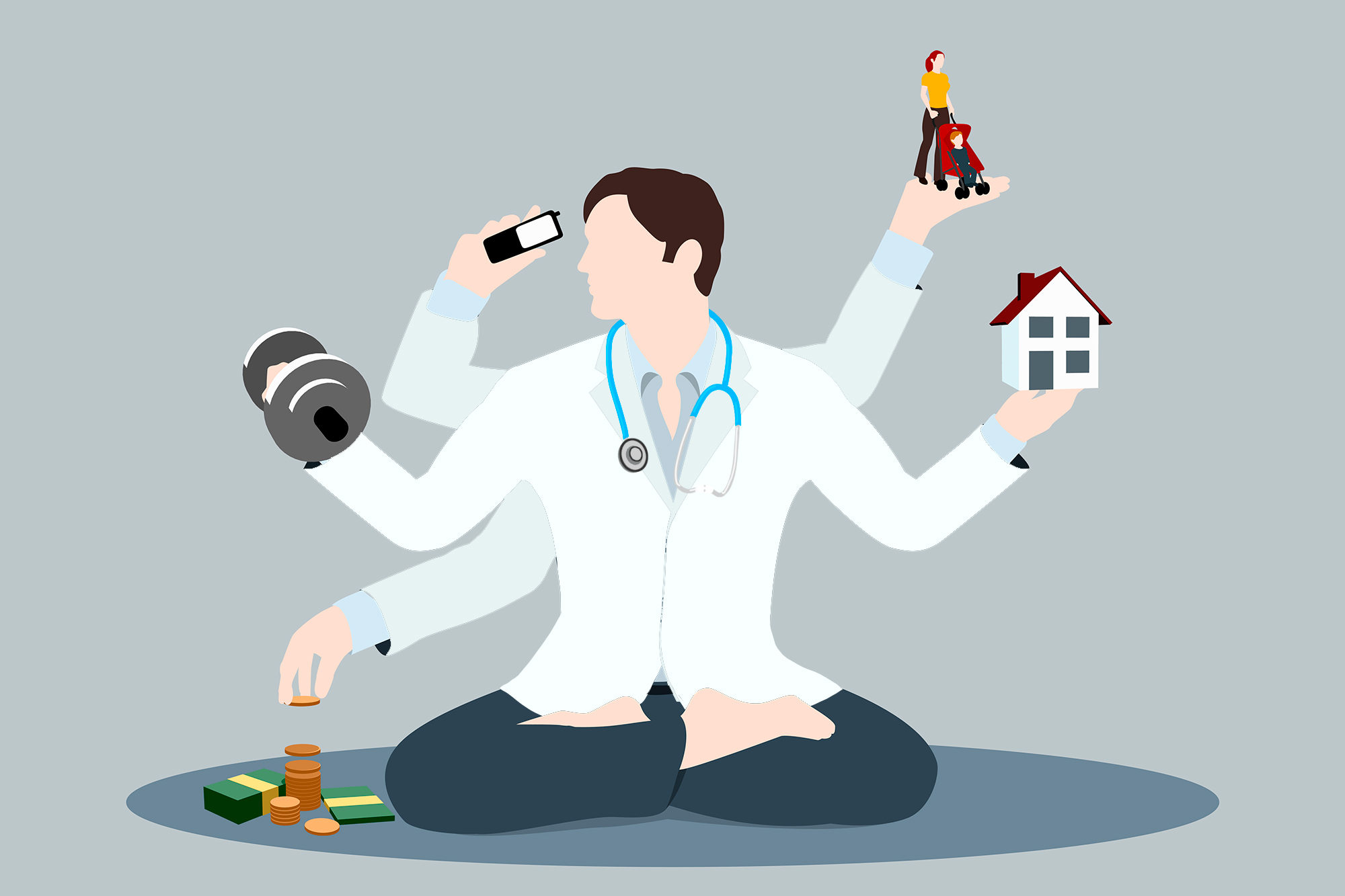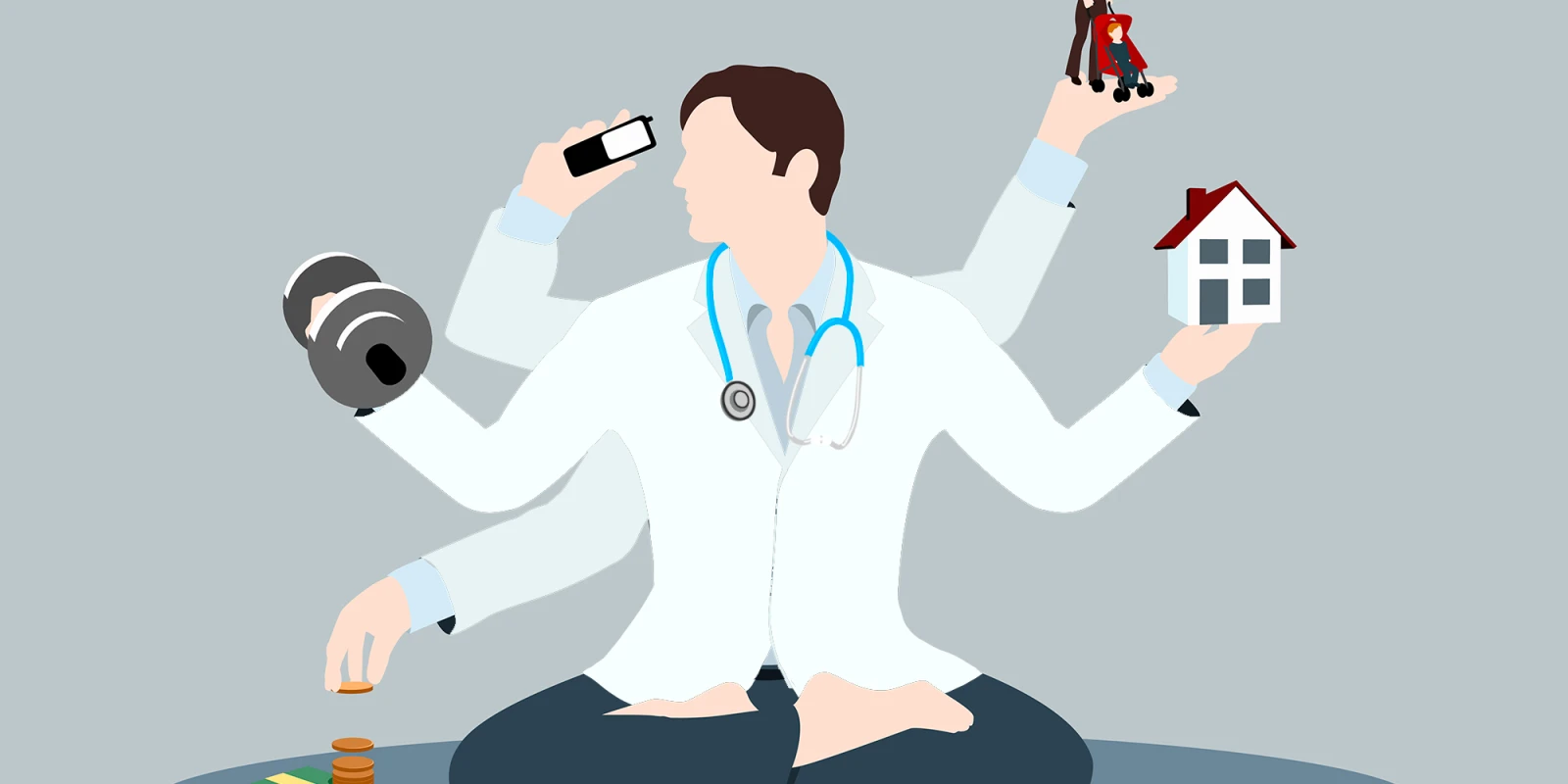 I was looking forward to a dinner a friend invited me to, along with several other people from work and residency, to meet his new girlfriend. About 10 minutes into the meal, I felt and looked like I had just gotten out of a swimming pool. I was sweating. A lot. I thought to myself, "Why do these people keep their house so hot?" Then I looked around and realized that no one else was sweating. Looking back, this was the first time I can remember that something was off.
I was looking forward to a dinner a friend invited me to, along with several other people from work and residency, to meet his new girlfriend. About 10 minutes into the meal, I felt and looked like I had just gotten out of a swimming pool. I was sweating. A lot. I thought to myself, "Why do these people keep their house so hot?" Then I looked around and realized that no one else was sweating. Looking back, this was the first time I can remember that something was off.
Over the next 12 months, other symptoms arose. I was experiencing signs and symptoms of GERD along with daily headaches. My essential tremor was getting worse. My wife and I were getting into a lot of arguments, which was new for us because I was having a hard time controlling my anger. I wasn't sleeping. In fact, I hadn’t slept through the night for more than 10-20 days in the last year. Each night, I'd wake up three or four times, amped up, and unable to fall back to sleep with ease. I chalked it up to stress. I was tired all the time.
I thought that much of what I was experiencing was related to stress or burnout at work. I started to resent my job. Some of my friends and family thought it was because I had too much on my plate. Yet, I had always managed to juggle all of the balls in the air before without much difficulty.
When the Doctor Becomes the Patient
I ran out of the propranolol I had been taking for my essential tremor. No big deal, I wasn't performing any procedures that day and I could pick the prescription up later. Instead, I was going to play golf with one of my best friends. This was supposed to be an easygoing day. Who cared if my hands shook?
The loser always owed the winner a beer. After the first hole, I was up by one stroke. I was off to a good start. We teed off at the next hole and walked down for our next shot.
As my friend was hitting his second, a ball landed with a loud thump just past him and right at my feet. The group behind us was standing on the tee box. They had driven their golf ball into us while we were in the fairway without yelling, "Fore!" (This is a cardinal sin in the world of golf — getting hit by a driven golf ball can cause serious injury.)
Suddenly, my heart started to race and my hands shook.
Turning to my friend, I said, "When they come down here, you have to handle this. I can't control my emotions right now."
With palpitations in my chest, I experienced the first panic attack of my life. Not having a personality prone to anxiety, this was when I put it all together. Something was wrong.
Fortunately, my family medicine doctor put it together before I did. The thyroid-stimulating hormone test she ordered the week prior ended up being undetectable (<0.1 mU/ml). (Thank God for good primary care doctors!) A few weeks later, my endocrinologist diagnosed me with Grave's disease.
Doctors Are Human, Too
My endocrinologist, who was also my internal medicine clerkship director in medical school at Wake Forest, explained to me that Grave's disease often presents itself in times of stress. It all made sense. The last 12 months were very stressful. My wife started a full-time job and I was working more than full time (1.3 time).
Now, I was dropping off and picking up my kids, making dinner, doing dishes, folding laundry, and cleaning floors. I was happy to do all of this, of course, but it was a lot in addition to what I was already doing.
The year prior, I was publishing randomized control trials, going to committee meetings, winning teaching awards, taking care of very sick patients, and working more than I should. Now that my home responsibilities tripled, my work-life balance was off.
It was stressful.
There were a lot of things I wanted to accomplish at work, but none of them compared to my desire to be a good husband and dad. Yet, I wasn't doing a good job at home. Then, my Grave's disease reared its ugly head, which led me to feel burned out.
Burnout and Moral Injury Are Multifactorial
Work life, home life, and personal life don't always play well together. When they don't, it can lead to burnout.
Burnout has both systematic and individual causes. It is a mixture of systemic failures of the medical system, bad leadership, work-life imbalance issues, and a slew of other problems.
Over the past 12 months, something became clear to me. While our medical system is broken, doctors bring their individual problems to the table, too. These problems can impact our burnout at work. Particularly, when doctors don't feel supported or are less known by those who make decisions about their job.
Others could have problems like mine, a combination of workload and medical issues, or it could be something else. It could be a divorce, issues with substance abuse or alcoholism, or any other difficulties that make it challenging to find an appropriate work-life balance.
The point is that burnout and moral injury are multifactorial.
Regardless of the cause, I think the answer to burnout, work-life imbalance, compassion fatigue, and moral injury has two distinct solutions.
The first involves systemic solutions. These are often outside of our control. Ideally, medical leadership should focus on the systemic nature of the problem, just like the airline industry did when it solved their safety problems. The causes of burnout are many, but perhaps, they can have systematic answers.
Second, doctors should work toward financial independence in order to be in a better position to find their own solutions to work-life balance. With financial freedom, we may be able to pursue partial financial independence and retire early (FIRE), locum tenens, or even different jobs if we wanted.
It is our responsibility to fight for our desired work-life balance. We cannot depend on the system to fix itself. Instead, we must make sure we take care of our own financial freedom. That way, we can use financial independence as an escape hatch, if we ever need it.
In my situation, a combination of methimazole and partial FIRE (asking for fewer shifts after paying off all of our non-mortgage debt) resulted in a vast improvement in my work-life balance, happiness, and relationships at home; even if my family still prefers the house to be much warmer than this Grave’s patient would prefer.
Dr. James Turner is an academic anesthesiologist, author of The Physician Philosopher’s Guide to Personal Finance, and owner of The Physician Philosopher blog where he helps other physicians fight burnout with financial independence. He is also a husband, father of three, and avid Wake Forest sports fan.






